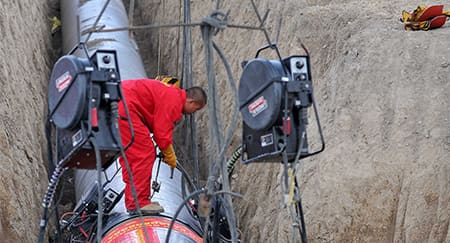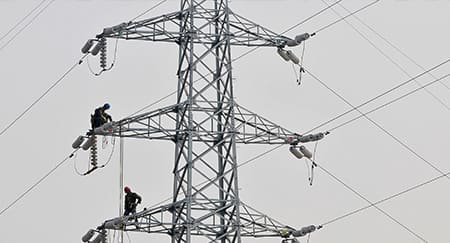There are many roads leading from energy to security. Michael Rühle outlines the reasons for NATO’s interest in energy security and what difference it could make.
Over the past years, energy security has turned into a major theme of the international security debate. Several developments account for this: Europe’s growing dependency on oil and gas; the growing energy needs of rising powers such as China and India; the depletion of fossil fuels expected to set in after the middle of this century; an intensifying debate on climate change; and a renewed interest of many nations in civilian nuclear energy.
Additional factors include armed threats to energy supplies, be they through terrorist attacks or piracy, and the political instability in many energy-producing states – including attempts by some of these states to (ab)use energy supplies as a political weapon.
NATO has a legitimate role to play in energy security. But what should this role look like?
All these developments point in the same direction: assuring energy supply may not be a straightforward military challenge, yet it clearly has a security dimension. As an Alliance that provides protection for almost 900 million citizens, and that features a unique network of partner countries, NATO has a legitimate role to play in energy security. But what should this role look like?
NATO’s new Strategic Concept provides a clear-cut answer to this question. Marking a noticeable shift from the protection of territory to the protection of people, the document does not only offer a vivid description of the growing vulnerability of Allied energy supplies, but also tasks NATO to “develop the capacity to contribute to energy security, including protection of critical infrastructure and transit areas and lines, cooperation with partners, and consultations among Allies on the basis of strategic assessments and contingency planning.”
However, translating this ambitious prescription into a concrete NATO agenda will not be easy. For a number of reasons, NATO Allies are approaching energy security with considerable hesitation.
One major reason for this caution is diverging national interests. As energy security is largely considered to be a national economic issue, many nations are not keen to discuss this subject in multinational fora. This is a challenge not only for NATO but also for the EU. Despite the European Commission’s efforts at drafting a forward-looking energy policy, member states continue to make individual deals with energy suppliers. In short, when it comes to energy security, nations tend to look after themselves.
Another reason for NATO’s cautious approach to energy security is the fact that the subject is inextricably linked with Russia. Russia owns the world’s largest reserves in coal, gas and uranium, and ranks No.7 in global oil reserves. It thus holds a key position in Europe’s energy supply. Given that Allied views on Russia’s foreign, security and energy policies have sometimes differed – owing, in part, to different degrees of energy dependency from Russia – there remains a hesitation to engage in a debate that might degenerate into a fruitless discussion on Russia.
A third reason for NATO’s caution is the fact that energy security is already being dealt with by a considerable number of actors, ranging from the EU to the International Energy Agency, and from the OECD to the private sector. A NATO role can therefore only be a complementary one – adding value rather than leading the process.
A final reason for NATO’s hesitation lies in its character as an Alliance predominantly identified with military means. While it is obvious that energy security can have a military dimension – as is demonstrated by NATO’s current anti-piracy operations off the coast of Somalia, which also help protect oil tankers – many Allies remain concerned that too visible a NATO role might unduly “militarise” what was essentially an economic subject.
NATO has managed over the past years to develop an agreed “acquis” on energy security which is tailored to NATO’s specific capabilities
Thus far, this combination of diverging political and economic interests on the one hand and NATO’s structural limitations on the other has hampered a systematic discussion on energy security among Allies. Despite these constraints, however, NATO has managed over the past years to develop an agreed “acquis” on energy security which is tailored to NATO’s specific capabilities. This “acquis” rests on three main pillars.
First, dialogue and sharing of information and intelligence among Allies, with partner countries, and the private sector. The major focus is on the security of critical energy infrastructure, particularly in energy producing and transit countries; the security of transport routes; and analyses of terrorist threats. Another aspect is the analysis of the secure supply of energy, i.e. fuel, for NATO forces in operations.
Second, projecting stability. This means first and foremost shaping the reform processes in NATO’s broader strategic environment. The emphasis is on political dialogue and military cooperation with partner countries in Europe, the Caucasus, Central Asia, the Middle East and the Gulf region. This group comprises energy producers, transit countries and consumers. Consequently, energy security features in many individual cooperation programmes.
Third, critical energy infrastructure protection. In principle, this is a national responsibility. However, at a nation’s request, NATO can contribute to the surveillance of sea lanes and territorial waters, either through civilian experts or military means. Moreover, NATO’s civil emergency planning capabilities can be employed in case of a man-made disaster, like an oil spill.
This brief list underlines that energy security links into many areas of NATO’s agenda, yet these individual activities hardly add up to a coherent policy. If NATO wants to better focus its energy security activities, and coordinate them seamlessly with other major actors, it needs a more systematic approach. This approach should be guided by the aim of making energy security more visible within the Alliance, and facilitate an enlightened discussion among NATO members.
It is evident that this objective can only be reached by way of a gradual approach. Only if all Allies become convinced that NATO offers tangible added value will they come along.
The first step of such a gradual approach must be to de-mystify energy security and make it a regular discussion item in NATO’s internal consultations. The opportunity for progress has never been better. As the international security debate is increasingly focusing on new challenges, notably cyber attacks and nuclear proliferation, the pressure on NATO to play its part in meeting these challenges is increasing as well. Moreover, many new security challenges have an energy dimension. The “Stuxnet” cyber attack against Iran’s controversial nuclear programme, including the Bushehr power plant, provides a vivid demonstration of the nexus between cyber threats and energy supplies. In a similar vein, the terrorist attacks against power plants in Russia and refineries in African and Arab countries reveal the nexus between terrorism and energy.
Together with the expansion of NATO’s in-house analytical capacity and improved intelligence-sharing among Allies, the new security challenges – including energy security – are now mirrored within NATO’s organizational structure
The holistic view of new threats in the new Strategic Concept is an important first step to making energy security a legitimate Alliance subject. An equally important second step is to give energy security a distinct organizational “home”. The creation of the “Emerging Security Challenges Division” in NATO’s International Staff provides just that. Drawing together the new security challenges (cyber, terrorism, proliferation, energy) into one division will not only allow for more systematic analysis, but also facilitate a more focused debate among Allies. Together with the expansion of NATO’s in-house analytical capacity and improved intelligence-sharing among Allies, the new security challenges – including energy security – are now mirrored within NATO’s organizational structure.
The third step towards a more systematic NATO approach to energy security consists of a sustained dialogue with other organizations such as the EU, the International Energy Agency, the OSCE and the Energy Charter. While all Allies agree that NATO’s role in energy security must be complementary to other relevant actors, true complementarity can only emerge if all actors know one another and thus avoid wasteful duplication. In addition, NATO must also expand the dialogue with the private energy sector that it initiated some years ago, in order to better understand the perspectives and requirements of the energy companies. The main focus of this dialogue with other institutions and the private sector will be the protection of critical energy infrastructure – an area where NATO possesses undisputed competence, and where many partner countries are seeking closer cooperation with NATO.
Another step to anchor energy security more systematically in NATO is the fusion of this subject with military-operational questions as well as with environmental and wider resources issues. At the military level, a debate about more efficient fuels has already set in, since such fuels promise a smaller logistical “footprint” in military operations. In addition, some of NATO’s operations, such as its anti-piracy Operation Ocean Shield, can help in ensuring key fuel shipping routes remain clear. Moreover, it is widely agreed that climate change can have consequences that could also affect NATO, for example humanitarian disasters.
Finally, the new debate about “rare earths” – which are of critical importance for modern industrial societies, in particular energy-saving technologies – is a stark reminder that energy security must not be understood solely as the unhindered supply of oil and gas. For an Alliance that considers itself a modern security institution, analysing the interconnectedness of these developments and discussing their security implications should no longer be the exception, but the rule.
A stronger, more coherent NATO role in energy security will not emerge by itself. It must be part of a broader effort to enhance NATO’s role as a consultative mechanism beyond immediate military-operational concerns
None of the steps described here will turn NATO into a premier energy security institution. Given the different views of Allies, it would be a major success if they were to agree to make energy security a natural part of their discussions, just as cyber defence and preventing proliferation have become regular items of NATO’s political agenda. Such an institutionalized dialogue among Allies is the precondition for considering further steps, such as, for example, discussions between the North Atlantic Council with individual partner countries or groups of partners (the so-called “28+n” formula) on energy security, or the setting up of training and defence reform teams for the protection of critical infrastructure.
A stronger, more coherent NATO role in energy security will not emerge by itself. It must be part of a broader effort to enhance NATO’s role as a consultative mechanism beyond narrow, traditional military-operational concerns. NATO must develop a culture of political discussion which is not confined to issues that may involve NATO militarily, but which also includes issues of broader political relevance. As long as every debate in NATO is suspected to serve only the preparation of military operations, an enlightened, forward-looking debate about emerging 21st century challenges will remain elusive. Only if Allies (re)discover NATO as a political consultation forum will they be able to treat energy security as a legitimate element in a comprehensive approach to security.




